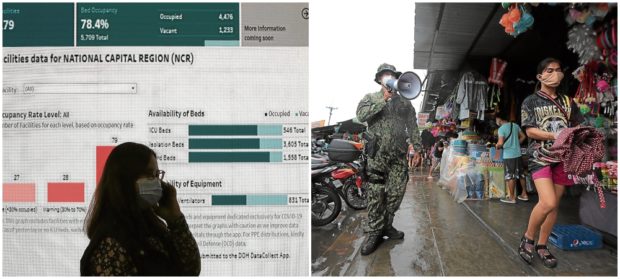Bill strengthening, widening scope of One Hospital Command filed in House

FILE PHOTO: Health Program Officer Maria Carissa Ocampo of the Department of Health answers phone queries at the One Hospital Command Center, located at the Metropolitan Manila Development Authority gymnasium in Makati City. The center monitors bed space at hospitals handling COVID-19 patients. At right, Police Master Sergeant Larry Undag uses a bullhorn to remind market goers and vendors to observe health regulations. —RICHARD A. REYES/GRIG C. MONTEGRANDE
MANILA, Philippines — A proposed measure that aims to strengthen and widen the capacity of the One Hospital Command Center (OHCC), the country’s hospital referral system that was highly utilized during the COVID-19 surges, has been filed at the House of Representatives.
Quezon 4th District Rep. Angelina Tan, chair of the House committee on health and proponent of House Bill No. 9633, said the bill mandates the creation of the National Patient Navigation and Referral System (NPNRS), which would help patients determine the right healthcare system for them based on their condition.
Tan said her proposal seeks to update the OHCC by establishing a National Patient Navigation and Referral Center (NPNRC) that will link people to help-desks and assistance centers across health facilities to ensure that poor families and patients will get the assistance they need.
She also stressed that the bill aims to help hospitals ensure the Universal Health Care Act is implemented properly.
‘The NPNRS is designed to support, strengthen, and facilitate the provision of health services of primary care providers acting as the navigator, coordinator, and initial and continuing point of contact in the health care delivery system pursuant to Republic Act No. 11223, otherwise known as the ‘Universal Health Care Act’,” Tan said in a statement on Tuesday.
“This important legislation serves as a complementary measure to the UHC law,” she added.
The OHCC was heavily utilized during the recent COVID-19 surge that affected Metro Manila and nearby provinces of Bulacan, Cavite, Laguna, and Rizal as many hospitals reached full capacity level.
Vice President Leni Robredo, who mounted one of the most highly-acclaimed COVID-19 response programs like the Bayanihan E-Konsulta which provides telemedicine assistance to possibly sick patients, noted that the OHCC has been a big help in their COVID-19 operations.
However, she admitted that as much as OHCC’s functions help the COVID-19 response, it is really limited — leading people who were frantically calling OHCC to resort to other means like home-based care and telemedicine.
“We have people desperately trying to call the One Hospital Command Center and people trying to get in touch with hospitals as far north as Nueva Ecija and hospitals in Laguna and Batangas. We have heard many stories of people dying while waiting for hospital admissions,” Robredo said last March 29, at the height of an infection surge in the National Capital Region.
READ: Robredo: Data on vacant COVID-19 hospital beds far from reality on the ground
READ: Robredo asks DOH again: If hospitals aren’t full, why are COVID-19 patients lining up?
If her bill is enacted into law, Tan said the proposed NPNRS will support hospitals and establish a network of healthcare facilities throughout the country.
“Once enacted into law, the NPNRS will support and strengthen the province-wide and city-wide health care provider networks throughout the country; and facilitate vertical and horizontal linkages and coordination among local government units, hospitals, infirmaries, other health facilities, telehealth service providers, local and national government agencies to maximize the use of limited health resources and improve access to quality health services for patients,” she explained.
“It will likewise serve as a guide in directing patients as well as a gatekeeper in ensuring rational and efficient use of existing health resources; interconnect and facilitate communication among hospitals, infirmaries, other health facilities, telehealth service providers, local and national government agencies to improve access to quality health services for patients; and implement patient navigation services and referral mechanisms,” she added.
Linking hospitals during a pandemic appears to be important, as Taiwan — hailed to have one of the best COVID-19 responses before their current surge — credits the healthcare system linkage as to why they were able to beat COVID-19 for a time.
According to Taiwan Minister of Health and Welfare Dr. Chen Shih-chung, one of the things they did to stop the spread of COVID-19 was to link hospitals across the country — which avoided having overwhelmed hospitals as the network can allocate other patients to other hospitals.
This system, Taiwan said, has resulted in zero deaths among infected health workers — despite being very near to China, the source of the latest coronavirus strain that causes COVID-19.
READ: Taiwan’s formula vs COVID-19: Prioritize effective health measures to avoid economic downturn
KGA
For more news about the novel coronavirus click here.
What you need to know about Coronavirus.
For more information on COVID-19, call the DOH Hotline: (02) 86517800 local 1149/1150.
The Inquirer Foundation supports our healthcare frontliners and is still accepting cash donations to be deposited at Banco de Oro (BDO) current account #007960018860 or donate through PayMaya using this link.














